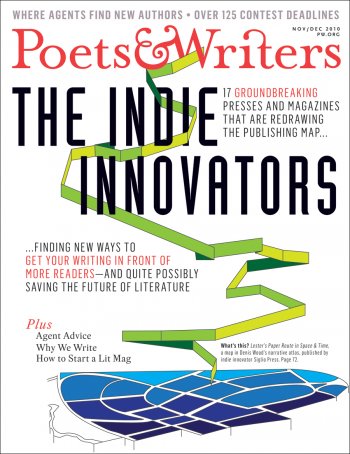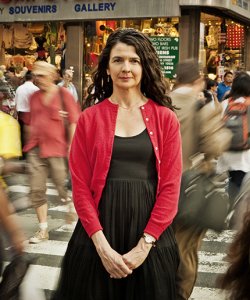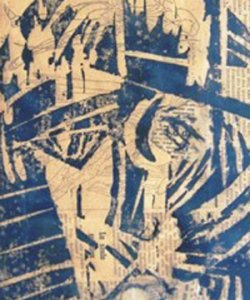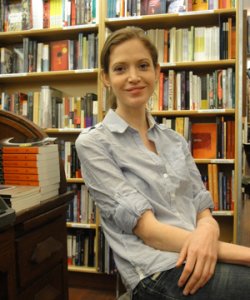
Seventeen innovative magazines and presses; profiles of poet and Poetry editor Christian Wiman, memoirist Heather Sellers, and novelist John Casey; advice from an agent; the inside scoop on starting a literary journal; and more.
Jump to navigation Skip to content

Seventeen innovative magazines and presses; profiles of poet and Poetry editor Christian Wiman, memoirist Heather Sellers, and novelist John Casey; advice from an agent; the inside scoop on starting a literary journal; and more.
With his new collection, Every Riven Thing, published this month by Farrar, Straus and Giroux, poet and Poetry editor Christian Wiman has performed a powerful imaginative act of reclamation, reconciliation, and peace that resonates...
Even before his beloved novel Spartina won the National Book Award in 1989, John Casey had written its sequel. So why was Compass Rose just published—and was it worth the wait?

Staring down a disorder that prevents her from recognizing faces offers ample material for a memoir, but Heather Sellers tackles much more in You Don't Look Like Anyone I Know.
Seventeen groundbreaking presses and magazines that are finding new ways to get writing in front of more readers—and quite possibly saving the future of literature.
Instructions for how to make a little book in an instant—no binding required.
Taking a cue from the bookmakers of ancient Egypt, we demonstrate a simple stitch that produces an intricate binding.
Eleven literary agents, including Diana Finch, Denise Shannon, and Peter Steinberg, name the magazines they turn to first in search of new talent.
A survey of professional opinions, including those of the New Yorker's Paul Muldoon and the Southern Review's Jeanne Leiby, about the Paris Review's decision to reject previously accepted poems.
The new Lit Mag Adoption Program is designed to introduce journals into creative writing course curricula and engage student writers as readers and members of a national literary community.
With so many good books being published every month, some literary titles worth exploring can get lost in the stacks. Page One offers the first lines of a dozen recently released books, including Leslie Marmon Silko's The Turquoise Ledge and Julia Franck's The Blindness of the Heart, as the starting point for a closer look at these new and noteworthy titles.
A look at the retro text editors and Web applications that more and more writers are using to roll back the reach of new media.
The Virginia Quarterly Review was rocked by the July 30 suicide of its managing editor, Kevin Morrissey, leaving the award-winning magazine’s future in doubt, as well as that of its editor.
Small Press Points highlights the happenings of the small press players. This issue features Sidebrow, the San Francisco–based independent press that publishes "works by multiple authors who aren’t timid about crossing genre boundaries."
Literary MagNet chronicles the start-ups and closures, successes and failures, anniversaries and accolades, changes of editorship and special issues—in short, the news and trends—of literary magazines in America. This issue's MagNet features Pleiades, Nashville Review, Sycamore Review, One Story, the Oxford American, the Awakenings Review, Fairy Tale Review, and Bound Off.

Portraits of Henry Miller “as a demon” and Guillaume Apollinaire, two of the thirty pieces featured in Beyond the Words: Author Portraits by Carl Köhler, currently on exhibit at the University of Chicago’s Joseph Regenstein Library.
Over the past few months fiction writer Jonathan Papernick, fed up with traditional mechanisms for bookselling, has followed the lead of the organic farmers, cheese mongers, and artisan bakers of community green markets by selling his books direct,...
Rather than bemoan all the reasons why this is a terrible time to enter publishing and an even more terrible time to seek funding, Sophie Beck and her coeditors made a plan—and executed it—to accomplish one of the best things they've ever done:...

In the sixth installment of our series Inside Indie Bookstores, contributor Jeremiah Chamberlin travels to New York City to speak with Sarah McNally, owner of McNally Jackson Books.

When is the best time in your career to look for representation, and when should you call off an author-agent relationship? Terra Chalberg, whose clients include Lori Ostlund and Glenn Taylor, tackles these questions and more.
From Pavlov's bell to Francis Ford Coppola's orange, fiction writer Benjamin Percy discusses how ordinary objects, setting, and speech can generate electricity in every story.
Having won a fiction prize in college, Laura Maylene Walter entered postgraduate life with instant fame, but it wasn't long before she found herself disappointed both by her lack of commercial success and her work itself. Only after she returned to...
While attempting to look beyond the borders of North Korea—where there is no such thing as art for art's sake and authors must describe reality as the government defines it—contributing editor Stephen Morison Jr. discovers just how far the Communist...